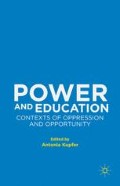Abstract
Power has numerous, diverse, even opposing meanings. Classical approaches, such as Max Weber’s, define it as coercion; that is, the imposition of one person’s will over another’s. In contrast, Hannah Arendt saw power as the ability to act. The meaning of education is similarly contested, comprehending knowledge acquisition, emancipation and liberation on the one hand and estrangement, obedience and suppression on the other. As a consequence, the study of the interrelationships between these processes must draw on different accounts of, and perspectives on, a variety of concepts and analyses. Nevertheless, all the analyses of concepts of power in this volume try to avoid the simple, uncritical notion of legitimate leadership directed toward ‘best practices’. The authors propose a counterweight to mainstream education studies on school effectiveness, comparisons of attainment and performance, and institutional leadership. They cover both the broad critical spectrum and the contradictory empirical findings to start a debate on how power over education and power in education affect today’s societies.
Access this chapter
Tax calculation will be finalised at checkout
Purchases are for personal use only
Preview
Unable to display preview. Download preview PDF.
References
Apple, M. (1995) [1982] Education and Power. Boston, London: Ark Paperbacks.
Ball, S. J.(2013) Foucault, Power, and Education. New York, London: Routledge.
Bishop, R.; Glynn, T. (2003) [1999] Culture Counts. Changing Power Relations in Education. Palmerston North: Dumore Press.
Bowles, S.; Gintis, H. (1976) Schooling in Capitalist America. London: Routledge and Kegan Paul.
Cossa, J. A. (2008) Power, Politics, and Higher Education in Southern Africa. International Regimes, Local Governments, and Educational Autonomy, Amherst, New York: Cambria Press.
Darder, A. (1991) Culture and Power in the Classroom. A Critical Foundation for Bicultural Education Westport: Greenwood Publisher.
De Lissovoy, N. (2008) Power, Crisis, and Education for Liberation. Rethinking Critical Pedagogy. Basingstoke, Palgrave Macmillan.
Freire, P. (1973) Pedagogy of the Oppressed. New York: Seabury.
Karabel, J. Halsey, A. H. (eds) (1977) Power and Ideology in Education. New York: Oxford University Press.
Laginder, A.-M. et al. (eds) (2013) Popular Education, Power and Democracy. Swedish Experiences and Contributions. Leicester: National Institute of Adult Continuing Education.
Moore, R. et al. (2012) Knowledge, Power and Educational Reform: Applying the Sociology of Basil Bernstein. Oxon: Routledge.
Parsons, M. D. (1997) Power and Politics. Federal Higher Education Policy Making in the 1990s. Albany: State University of New York Press.
Popkewitz, T. S. (ed.) (1993) Changing Patterns of Power: Social Regulation and Teacher Education Reform. New York, State University of New York.
Robertson, S. et al. (2002) ‘GATS and the Education Service Industry: The Politics of Scale and Global Reterritorilization’, Comparative Education Review, 46(4), 472–496.
Rosen, L.; Farrokhzad, S. (eds) (2008) Macht — Kultur — Bildung. Festschrift für Georg Auernheimer, Münster: Waxmann.
Stensaker, B.; Harvey, L. (eds) (2011) Accountability in Higher Education. Global Perspectives on Trust and Power. New York and London: Routledge.
Venger, A. (2007) ‘The constitution of a new global regime: higher education in the GATS/WTO framework’, in: D. Epstein et al. (eds) World Yearbook of Education 2008, Geographies of Knowledge, Geometries of Power: Framing the Future of Higher Education, New York and London: Routledge, pp. 111–127.
Youdell, D. (2009) School Trouble: Identity, Power and Politics in Education. Oxon: Routledge.
Young, M. F. D. (ed.) (1971) Knowledge and Control. New Directions for the Sociology of Education. London: Collier-Macmillan.
Young, M. F. D. (2008) Bringing Knowledge Back In: From Social Constructivism to Social Realism in the Sociology of Education. London: Routledge.
Young, M. F. D. (2014) ‘Powerful knowledge as a curriculum principle’, in Young, M. and Lambert, D. (eds) Knowledge and the Future School. Curriculum and Social Justice, London: Bloomsbury, pp. 65–88.
Editor information
Editors and Affiliations
Copyright information
© 2015 Antonia Kupfer
About this chapter
Cite this chapter
Kupfer, A. (2015). Introduction. In: Kupfer, A. (eds) Power and Education. Palgrave Macmillan, London. https://doi.org/10.1057/9781137415356_1
Download citation
DOI: https://doi.org/10.1057/9781137415356_1
Publisher Name: Palgrave Macmillan, London
Print ISBN: 978-1-349-56959-5
Online ISBN: 978-1-137-41535-6
eBook Packages: Palgrave Education CollectionEducation (R0)

